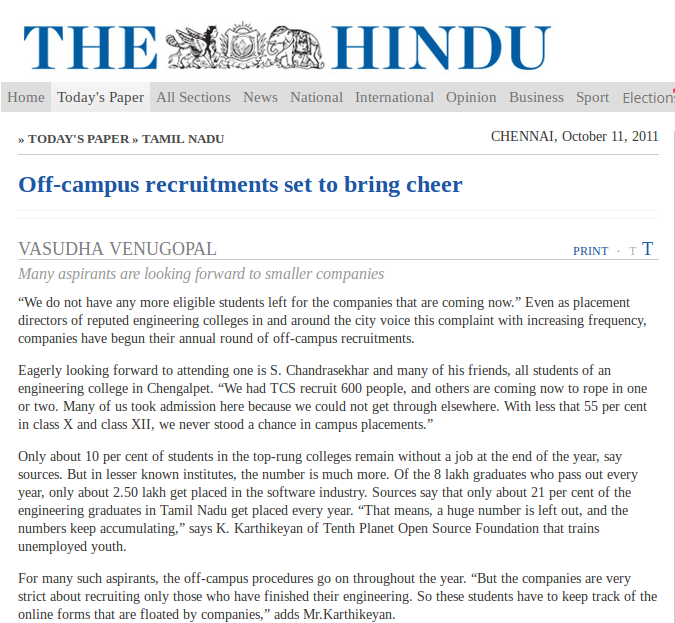
We do not have any more eligible students left for the companies that are coming now – Even as placement directors of reputed engineering colleges in and around the city voice this complaint with increasing frequency, companies have begun their annual round of off-campus recruitments.
Eagerly looking forward to attending one is S. Chandrasekhar and many of his friends, all students of an engineering college in Chengalpet. “We had TCS recruit 600 people, and others are coming now to rope in one or two. Many of us took admission here because we could not get through elsewhere. With less that 55 per cent in class X and class XII, we never stood a chance in campus placements.”
Only about 10 per cent of students in the top-rung colleges remain without a job at the end of the year, say sources. But in lesser known institutes, the number is much more. Of the 8 lakh graduates who pass out every year, only about 2.50 lakh get placed in the software industry. Sources say that only about 21 per cent of the engineering graduates in Tamil Nadu get placed every year. “That means, a huge number is left out, and the numbers keep accumulating,” says K. Karthikeyan of Tenth Planet Open Source Foundation that trains unemployed youth.
For many such aspirants, the off-campus procedures go on throughout the year. “But the companies are very strict about recruiting only those who have finished their engineering. So these students have to keep track of the online forms that are floated by companies,” adds Mr.Karthikeyan.
Getting in through off-campus recruitment is slightly difficult for fresh graduates as many companies in search of replacements for employees who have left the organisation, prefer experienced hands, says R. Rajaraman, who got placed three years ago with TCS. The other option is to work for some small company for 2-3 years, gain experience and then apply in these top companies, he says.
Some companies often specify higher scores in class X and class XII which many students, especially the CBSE ones find difficult to fulfil. However, companies including Wipro, Syntel and Honeywell are often an exception, at least in off campuses. “And many telecom companies often do not pay much heed to academics, especially performance in schools, but the candidates have to undergo difficult entrances. The ones with technical expertise can crack them easily,” says Rohini Dhar, HR consultant, BHEL.
Being constantly in touch with alumni through group mails and conducting regular refresher courses in technology and aptitude can be useful, K. K. Sivagnana Prabhu, head, Training and Placement, RMK Engineering College. “Students with four or five standing arrears are motivated to clear at least three, so that they are considered by a few IT firms,” he adds.
Additionally, many companies, including Polaris, Hexaware and Aricent, recruit students already trained in specific technologies from training institutes. Most of these companies have a team of committed HR consultants who rope in lateral talent, and around 10-12 students from selected campuses. These companies do not have aggressive campus placement procedures targeted at recruiting students in bulk.
“The wise thing for candidates left out in campus recruitment is to get trained in specific technologies. Many tier 2 companies to reduce training costs prefer candidates who can be directly put to work,” says Mr. Karthikeyan.
Also with the bulk recruiter getting maximum importance, many smaller companies that vie for talent are left with little choice, than to focus on off campuses. “Squeezed in between slots, many of them decide to concentrate on the projects made by the students or response to certain technical questions, because ssssss cream is already taken away. But often, we see that students would join the bulk recruiter because their friends have also been recruited, and the pay is at least 10 per cent more,” says R. K. Devyani, a consultant with iFlex Services and Solutions.
http://www.thehindu.com/todays-paper/tp-national/tp-tamilnadu/offcampus-recruitments-set-to-bring-cheer/article2527053.ece